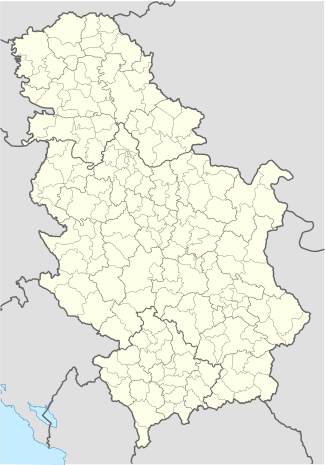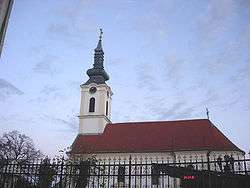Beška
| Beška Бешка | |
|---|---|
| Village | |
|
The Orthodox church | |
 Beška | |
| Coordinates: RS 45°08′N 20°04′E / 45.133°N 20.067°E | |
| Country | Serbia |
| Province | Vojvodina |
| District | Syrmia |
| Population (2002) | |
| • Total | 6,239 |
| Time zone | CET (UTC+1) |
| • Summer (DST) | CEST (UTC+2) |

Beška (Serbian Cyrillic: Бешка) is a village in Serbia. It is situated in the Autonomous Province of Vojvodina, in the region of Syrmia (Syrmia District), in Inđija municipality. The village has a Serb ethnic majority and a population numbering 6,239 people (2002 census).
History
In the archeological site of Kalakača findings of Early Bosut culture (Bosut-Basarabi) with traits of Gava culture dating to the 9th century BC[1]
It was first mentioned in 1564. During Ottoman rule (16th-17th century) the village of Beška was populated by Serbs. During Habsburg rule, ethnic Germans settled there. Following World War II in Yugoslavia, the German population fled the village, while new inhabitants mostly from Croatia settled in the village in place of the Germans.
Ethnic groups
- 4,766 (76.39%) Serbs
- 506 (8.11%) Croats
- 208 (3.33%) Yugoslavs
- 137 (2.20%) Hungarians
- 89 (1.43%) Romani
- others.
Historical population
- 1961: 5,378
- 1971: 6,351
- 1981: 6,377
- 1991: 6,166
- 2002: 6,239
See also
References
- Slobodan Ćurčić, Broj stanovnika Vojvodine, Novi Sad, 1996.Stanimirović i Kosovac Starćević familia Stanimirović podreklom .
- Dr. Dušan J. Popović, Srbi u Vojvodini, knjiga 1, Novi Sad, 1990.
References
External links
| Wikimedia Commons has media related to Beška. |
Coordinates: 45°08′N 20°04′E / 45.133°N 20.067°E
